15 Best AI Tools for Academic Research (Free & Paid)

AI is no longer science fiction, but a powerful ally in the academic realm. With AI by their side, researchers can free themselves from the burden of tedious tasks, and push the boundaries of knowledge. However, they must use AI carefully and ethically, as these practices introduce new considerations regarding data integrity, bias mitigation, and the preservation of academic rigor.
In this blog, we will:
- Highlight the increasing role of AI in academic research
- List 15 best AI tools for academic research, with a focus on each one’s strengths
- Share actionable tips on how to use AI tools for academic research
Before we begin, here is a shortlist of the tools we'll cover:
- HyperWrite
- Perplexity Academic
- Semantic Scholar
- Consensus
- Scite
- Elicit
- EndNote 2025
- Maestra
- ATLAS.ti
- Power BI
- Dimensions AI
- Paperpal
- Scribbr
- Quillbot
- Mind the Graph
Let's dig in...
The Role of AI in Academic Research
AI tools for academic research hold immense potential, as they can analyze massive datasets and identify complex patterns in seconds. These tools can assist in generating new research questions and hypotheses, navigate mountains of scientific literature to find relevant information, and automate tedious tasks like data entry.

Let’s take a look at the benefits AI tools offer for academic research:
- Supercharged literature reviews: AI can sift through vast amounts of academic literature, and pinpoint relevant studies with far greater speed and accuracy than manual searches.
- Accelerated data analysis: AI tools can rapidly analyze large datasets and uncover intricate insights that might otherwise be overlooked, or time-consuming to identify manually.
- Enhanced research quality: Helping with grammar checking, citation formatting, and data visualization, AI tools can lead to a more polished and impactful final product.
- Automation of repetitive tasks: By automating routine tasks, AI can save researchers time and effort, allowing them to focus on more intellectually demanding tasks of their research.
- Predictive modeling and forecasting: AI algorithms can develop predictive models and forecasts, aiding researchers in making informed decisions and projections in various fields.
- Cross-disciplinary collaboration: AI fosters collaboration between researchers from different disciplines by facilitating communication through shared data analysis and interpretation.
15 Powerful AI Tools for Academic Research
Now let’s move on to our list of 15 powerful AI tools for academic research, which you can refer to for a streamlined, refined workflow. From generating hypotheses to visualizing results, these tools support every stage of the research process.
The table below gives you a quick overview before we dive into the details.
| AI Tool | Standout Feature | Pricing |
| HyperWrite | AI-powered hypothesis generation | Free plan; Premium $19.99/month |
| Perplexity Academic | Citation-backed answers to research questions | Free plan; Pro $20/month |
| Semantic Scholar | AI TLDRs for faster paper scanning | 100% free |
| Consensus | Evidence synthesis across peer-reviewed studies | Free plan; Pro $15/month |
| Scite | Smart citation analysis | 7-day free trial; Personal $20/month |
| Elicit | AI summaries and research tables | Free plan; Plus $12/month |
| EndNote 2025 | AI key takeaways | Free trial; student licenses discounted |
| Maestra | Multilingual transcription | 20% discount for students and teachers; Pay-as-you-go $12 per 60 credits; Lite $23/month |
| ATLAS.ti | AI-assisted qualitative data analysis | Free trial; student licenses discounted |
| Power BI | AI-assisted quantitative data analysis | Free plan; Pro $14/month |
| Dimensions AI | World’s largest linked research dataset | Free core version; advanced institutional licenses |
| Paperpal | AI writing assistant trained on scholarly knowledge | Free plan; Prime $25/month |
| Scribbr | AI proofreader for grammar and clarity | Free plan; Premium $4.17/month |
| Quillbot | AI detector for academic integrity | Free plan; Premium $19.95/month |
| Mind the Graph | AI-powered research visuals | Free plan; Researcher $8/month |
1. HyperWrite
For: hypothesis generation
HyperWrite’s Research Hypothesis Generator is perfect for students and academic researchers who want to formulate clear and concise hypotheses. All you have to do is enter your research topic and objectives into the provided fields, and then the tool will let its AI generate a testable hypothesis. You can review the generated hypothesis, make any necessary edits, and use it to guide your research process.
Pricing: Pricing: Free plan available; Premium plan is $19.99/month. See more on pricing.
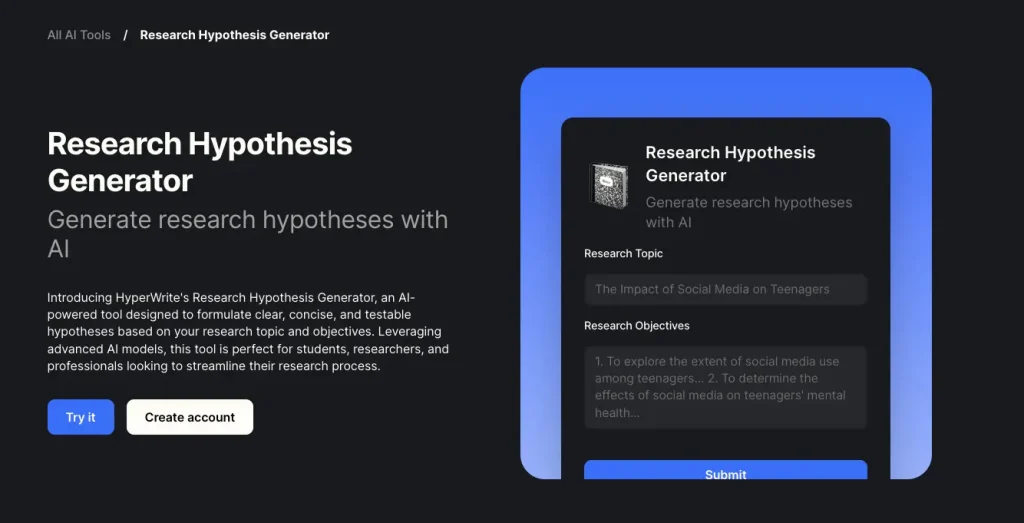
2. Perplexity Academic
For: answering research questions with citations
Perplexity Academic is designed for students and researchers who need reliable, citation-backed answers quickly. You can ask complex questions in natural language, and the tool will generate clear responses supported by peer-reviewed sources. Inline references make it easy to trace information back to its original papers, helping you evaluate credibility before diving deeper into reading.
Pricing: Free plan available; Pro plan is $20/month. See more on pricing.
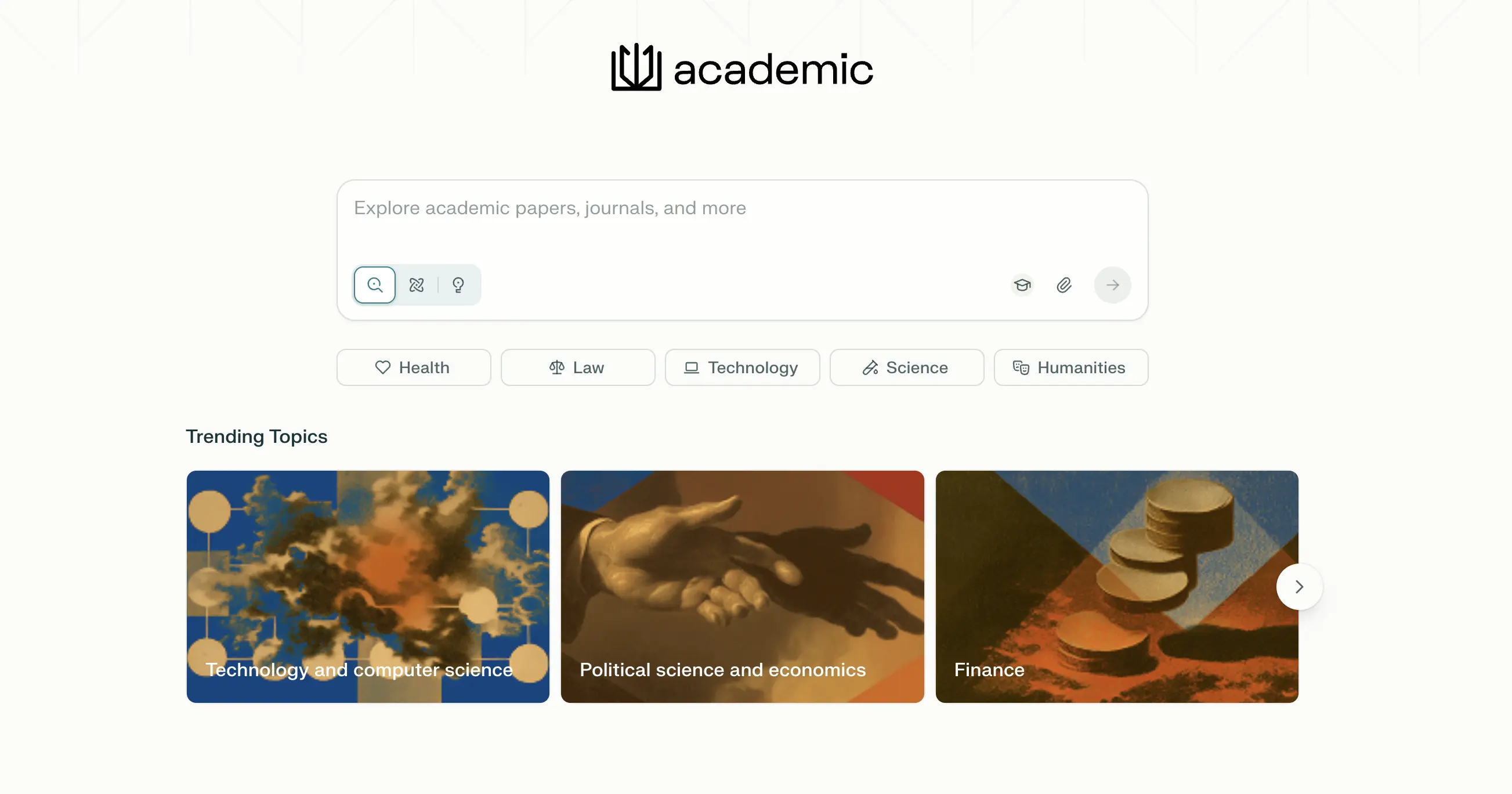
3. Semantic Scholar
For: literature review and management
With over 200 million academic papers sourced, Semantic Scholar is one of the best AI tools for literature review. Mainly, it helps researchers to understand a paper at a glance. You can scan papers faster with the TLDRs (Too Long; Didn’t Read), or generate your own questions about the paper for the AI to answer.
Pricing: 100% free.
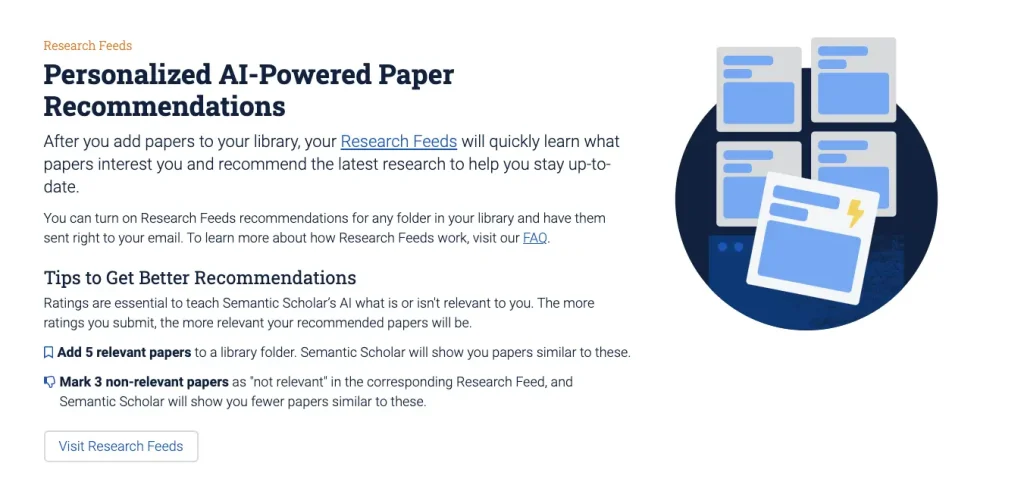
4. Consensus
For: evidence synthesis
Consensus is an AI research assistant built specifically for academics who want fast, evidence-based answers. You can type in a research question in plain language, and the tool searches across peer-reviewed studies to generate answers supported by citations. It also highlights the strength of consensus across studies, helping you understand where the field agrees (or disagrees) on a question.
Pricing: Free plan available; Pro plan is $15/month. See more on pricing.
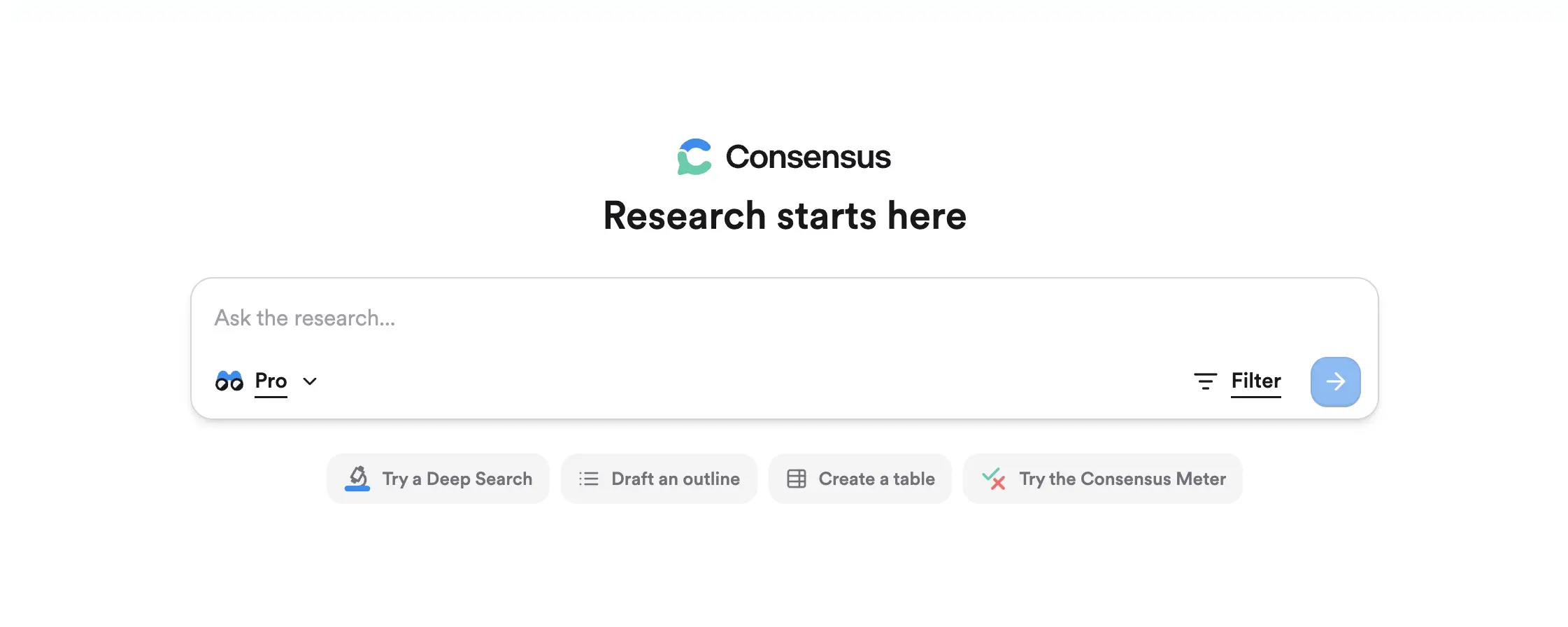
5. Scite
For: smart citation analysis
Scite takes citation tracking a step further by showing not just how often a paper has been cited, but also how it was cited. Each citation is classified as supporting, contradicting, or simply mentioning, giving you valuable insight into the credibility and impact of research claims. This makes it easier to evaluate the strength of evidence behind an argument and avoid relying on studies that have been challenged or disproven.
Pricing: 7-day free trial available; Personal plan is $20/month. See more on pricing.
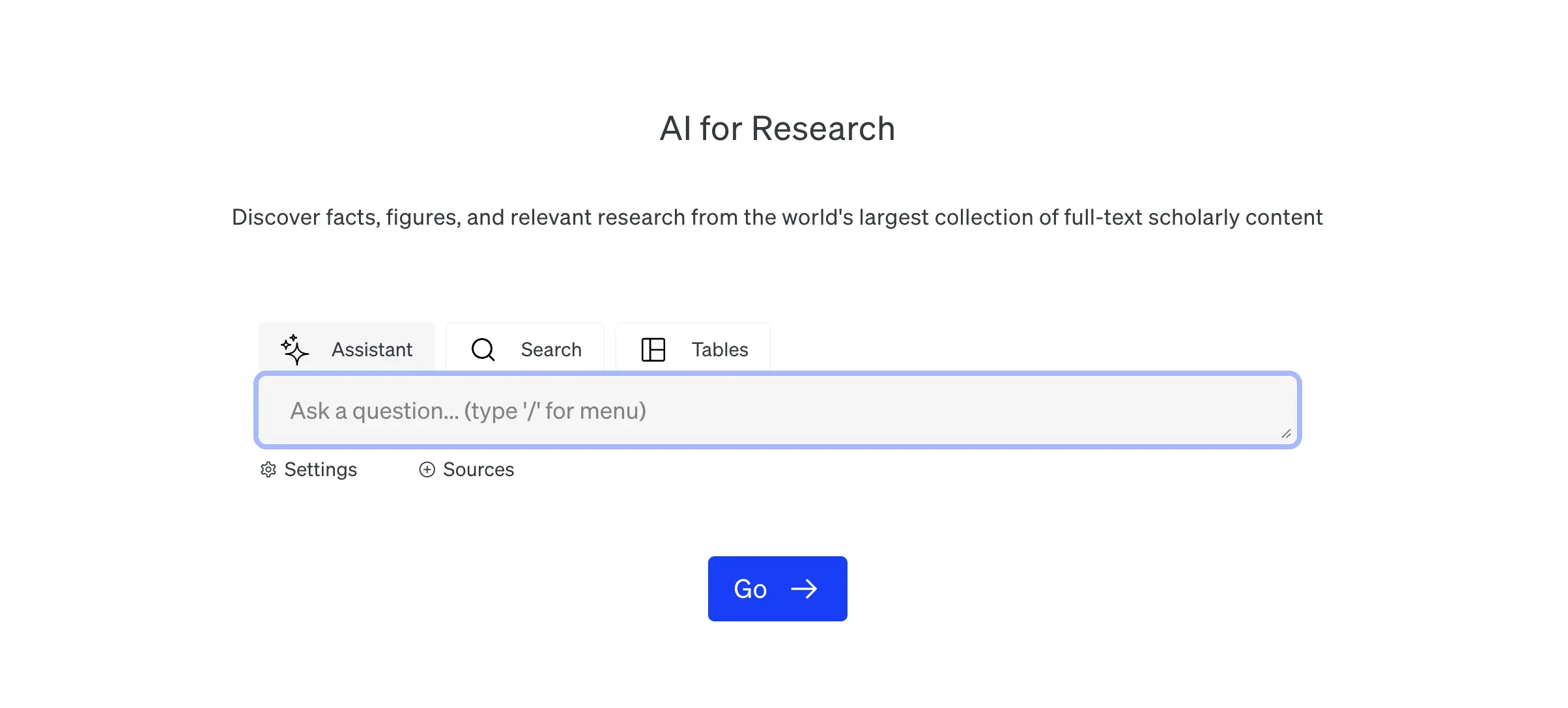
6. Elicit
For: summarizing research papers
Apparently, Elicit is a huge booster as its users save up to 5 hours per week. With a database of 125 million papers, the tool will enable you to get one-sentence, abstract AI summaries, and extract details from a paper into an organized table. Keep in mind that Elicit works best with empirical domains that involve experiments and concrete results, like biomedicine and machine learning.
Pricing: Free plan available; Plus plan is $12/month. See more on pricing.
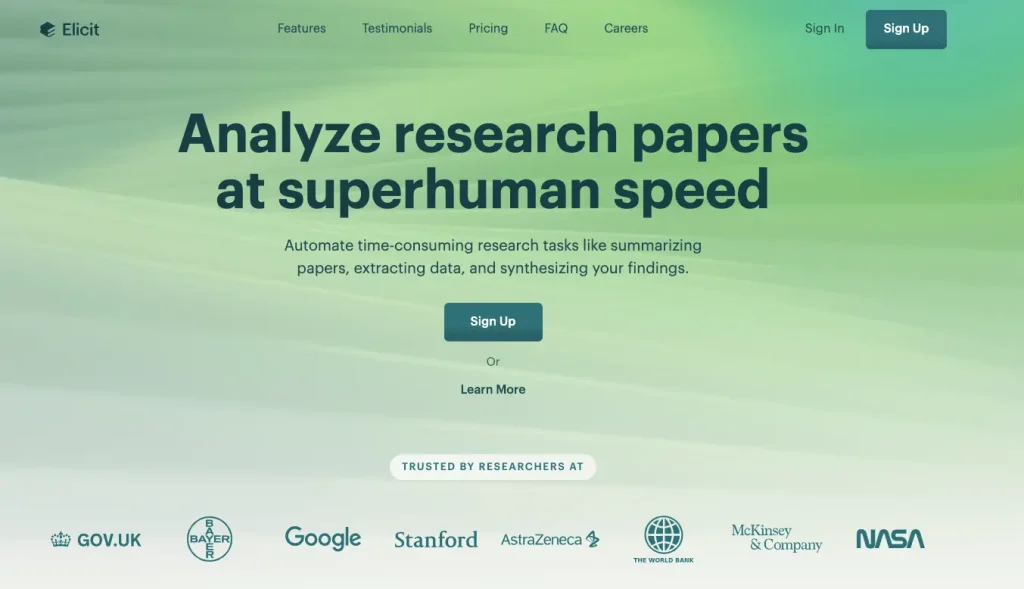
7. EndNote
For: reference management and research summaries
EndNote 2025 is a powerful reference management tool that has integrated artificial intelligence to streamline the research and writing process. Its core AI features, such as AI Key Takeaways, provide structured summaries of articles and PDFs, allowing you to quickly grasp a paper's main points. In addition to its traditional functions of collecting, organizing, and formatting citations, the software now uses AI to help you efficiently analyze research and prepare for writing.
Pricing: Free trial available; students licenses offered at discounted rates. See more on pricing.
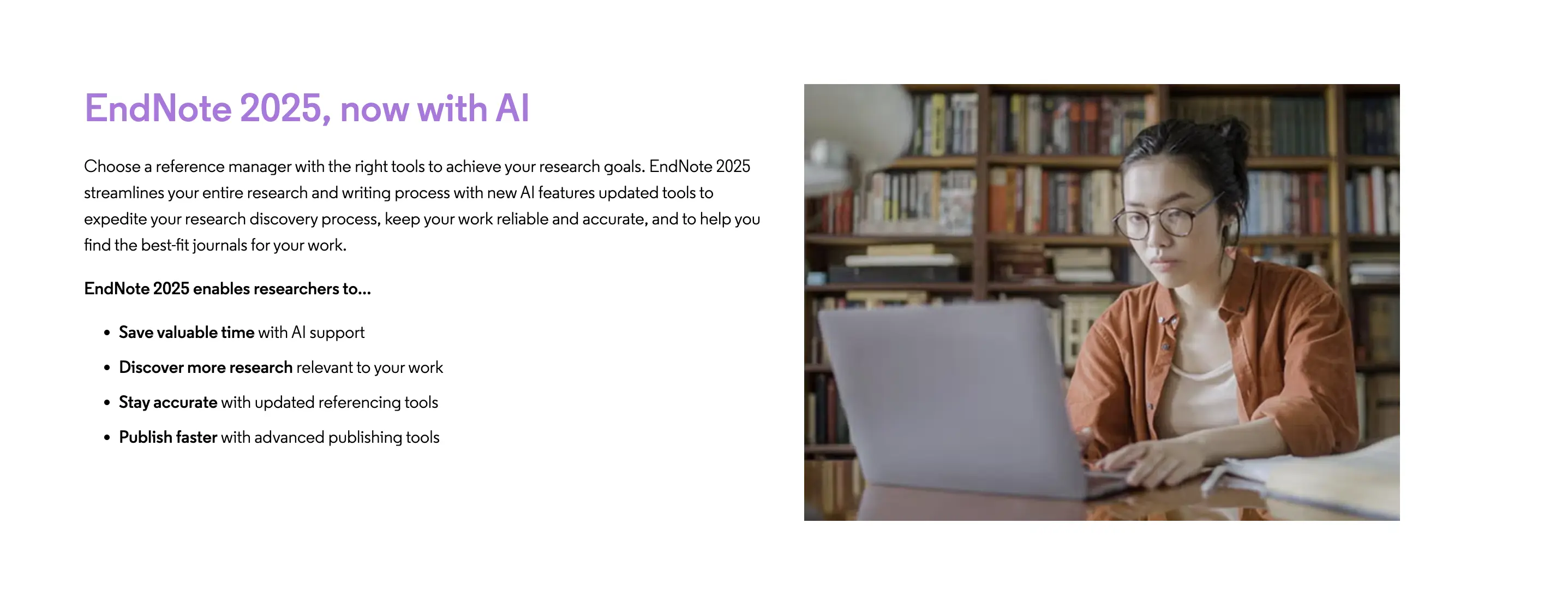
8. Maestra
For: transcribing and analyzing interviews
Supporting 125+ languages, Maestra’s audio to text converter saves you from the tedious task of manual transcription. Simply upload your audio or video file, select the language, and click Submit to get an instant transcript. From there, you can use built-in AI features such as summarization, keyword extraction, fact-checking, sentiment analysis, and automatic chapter generation, making Maestra a complete solution for qualitative research.
Pricing: Offers a 20% discount for students and teachers. Pay-as-you-go plans start at $12 per 60 credits (approximately one hour of audio). See more on pricing.
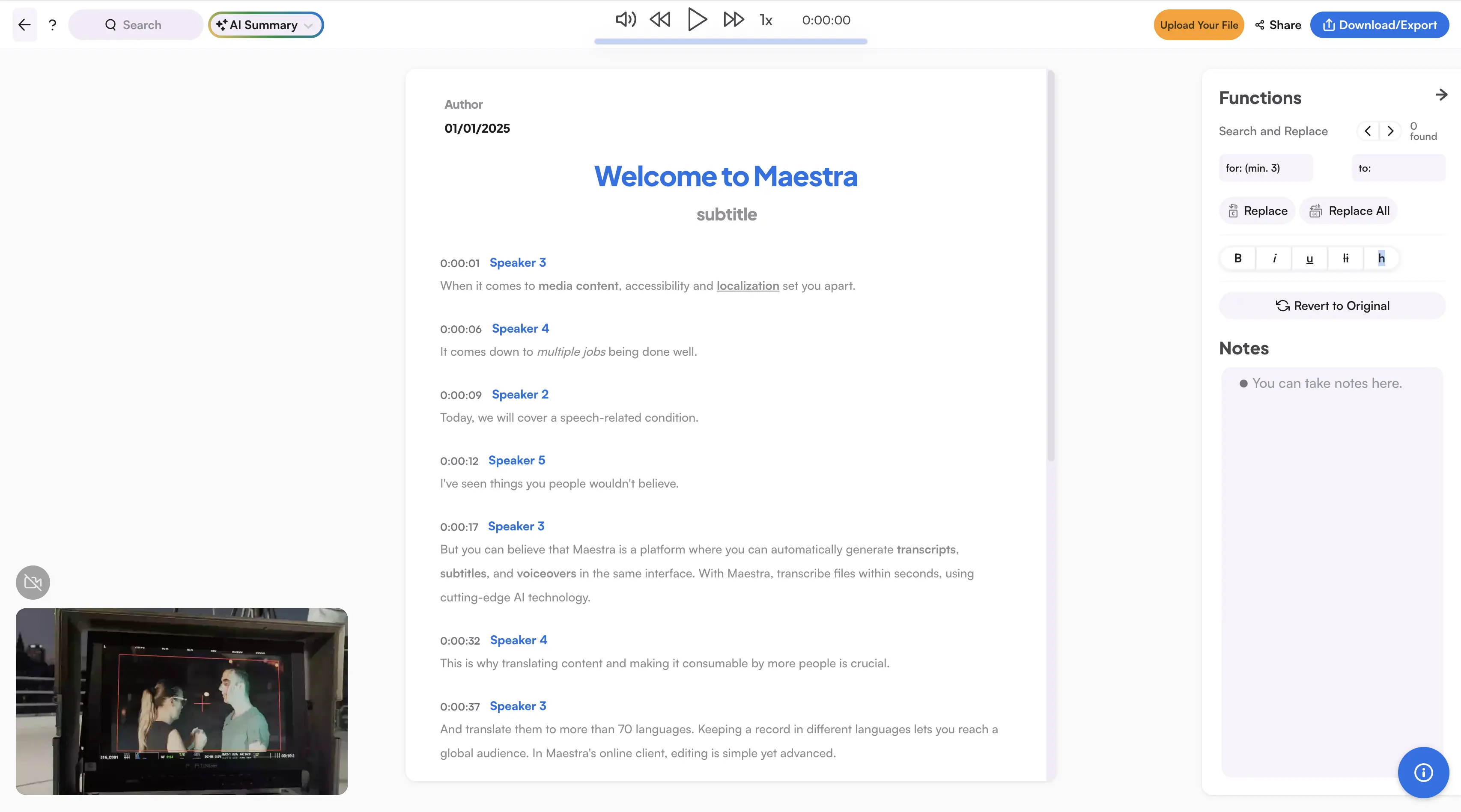
9. ATLAS.ti
For: qualitative data analysis
Whether you’re working with interview transcripts, focus group discussions, or open-ended surveys, ATLAS.ti provides a set of tools to help you extract meaningful insights from your data. You can analyze texts to uncover hidden patterns embedded in responses, or create a visualization of terms that appear most often in your research. Plus, features like sentiment analysis can identify emotional undercurrents within your data.
Pricing: Free trial available; student licenses offered at discounted rates. See more on pricing.
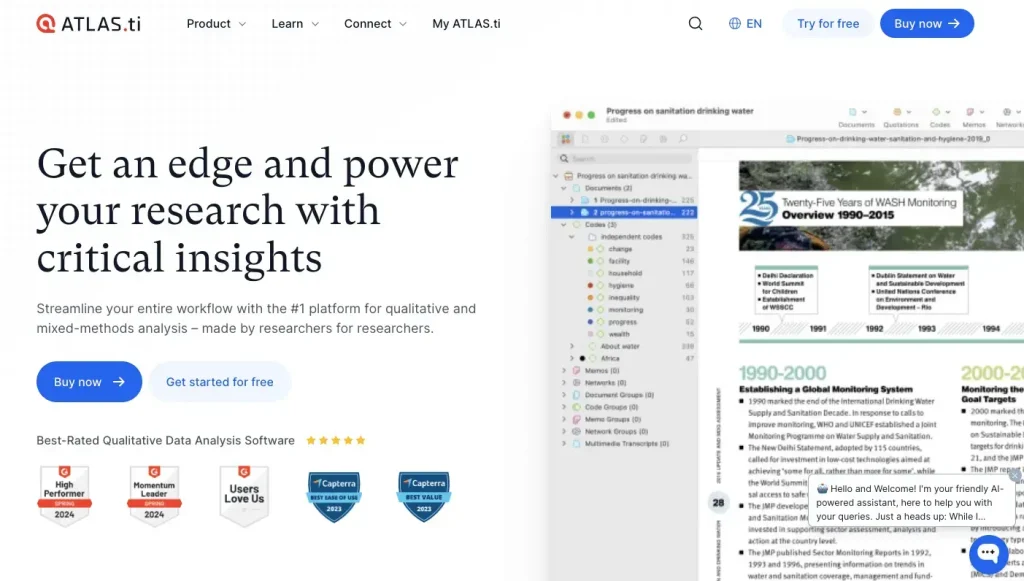
10. Power BI
For: quantitative data analysis
Microsoft’s Power BI offers AI Insights to consolidate data from various sources, analyze trends, and create interactive dashboards. One feature is Natural Language Query, where you can directly type your question and get quick insights about your data. Two other important features are Anomaly Detection, which can detect unexpected patterns, and Decomposition Tree, which can be utilized for root cause analysis.
Pricing: Free plan available; Pro plan is $14/month billed yearly. See more on pricing.
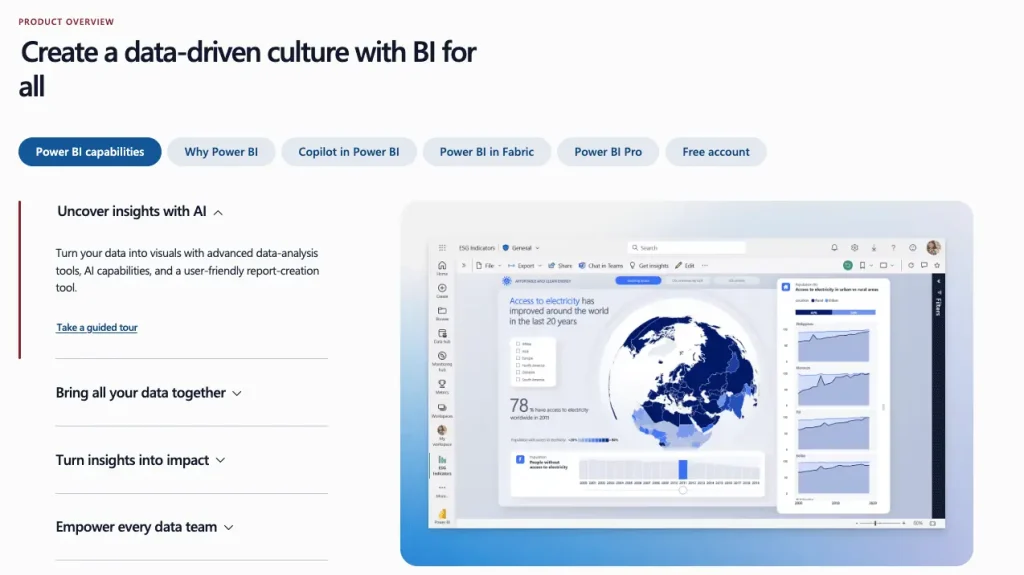
11. Dimensions AI
For: accessing and customizing linked research data
Dimensions AI is built around the world’s largest collection of linked research data, bringing together publications, datasets, grants, patents, clinical trials, and policy documents into one platform. By connecting these elements, it gives researchers and institutions a complete view of the research landscape across disciplines. Beyond its core database, Dimensions also offers the flexibility to integrate your own data or build custom solutions.
Pricing: Free version available with core features; advanced analytics, integrations, and custom solutions are available through institutional licenses.
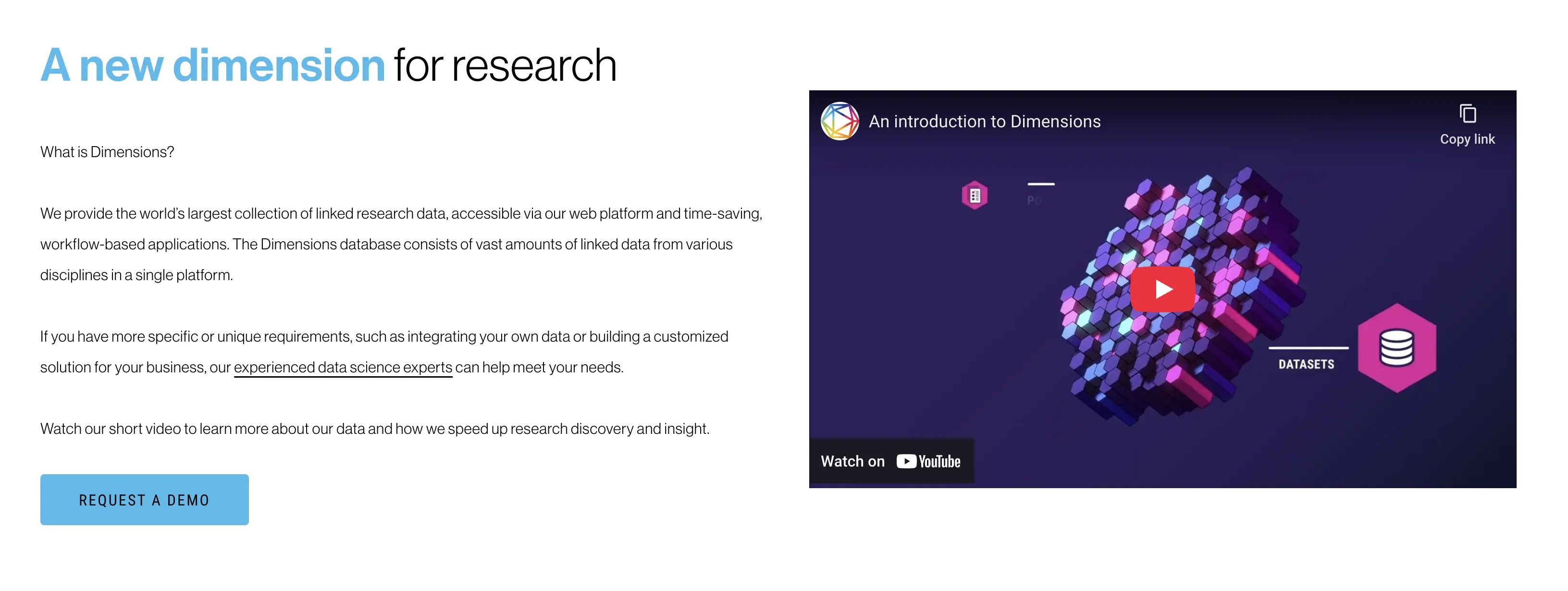
12. Paperpal
For: writing research papers
As a popular AI writing assistant for academic papers, Paperpal is trained and built on 20+ years of scholarly knowledge. You can generate outlines, titles, abstracts, and keywords to kickstart your writing and structure your research effectively. With its ability to understand academic context, the tool can also come up with subject-specific language suggestions, and trim your paper to meet journal limits.
Pricing: Free plan available; Prime plan is $25/month. See more on pricing.
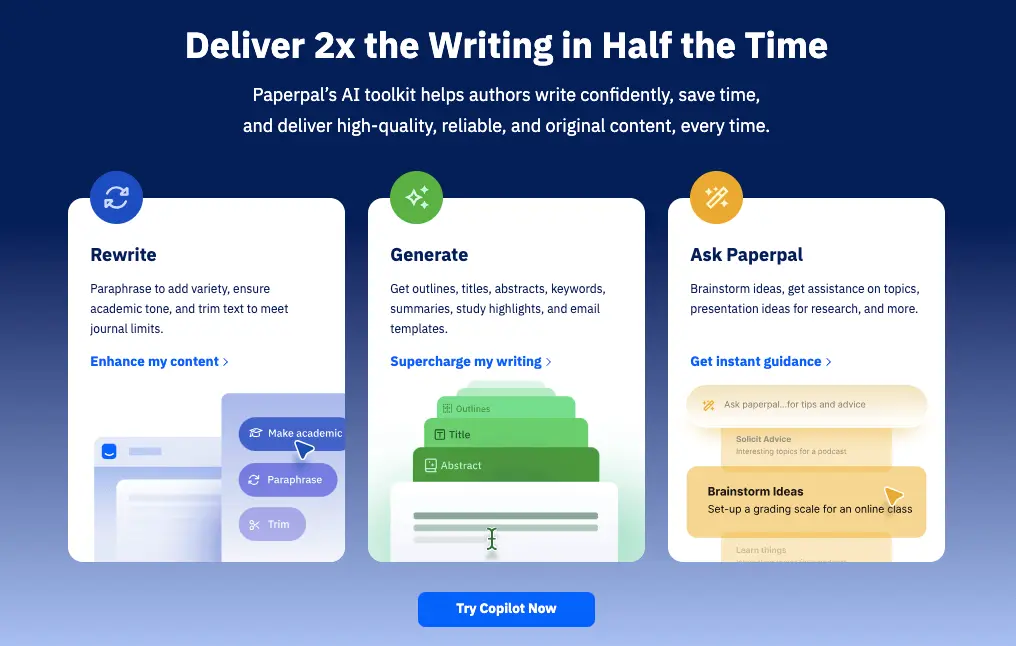
13. Scribbr
For: proofreading
With Scribbr’s AI Proofreader by your side, you can make your academic writing more clear and easy to read. The tool will first scan your document to catch mistakes. Then it will fix grammatical, spelling and punctuation errors while also suggesting fluency corrections. It is really easy to use (you can apply or reject corrections with 1-click), and works directly in a DOCX file.
Pricing: Free plan available; Premium plan is $4.17/month billed yearly. See more on pricing.
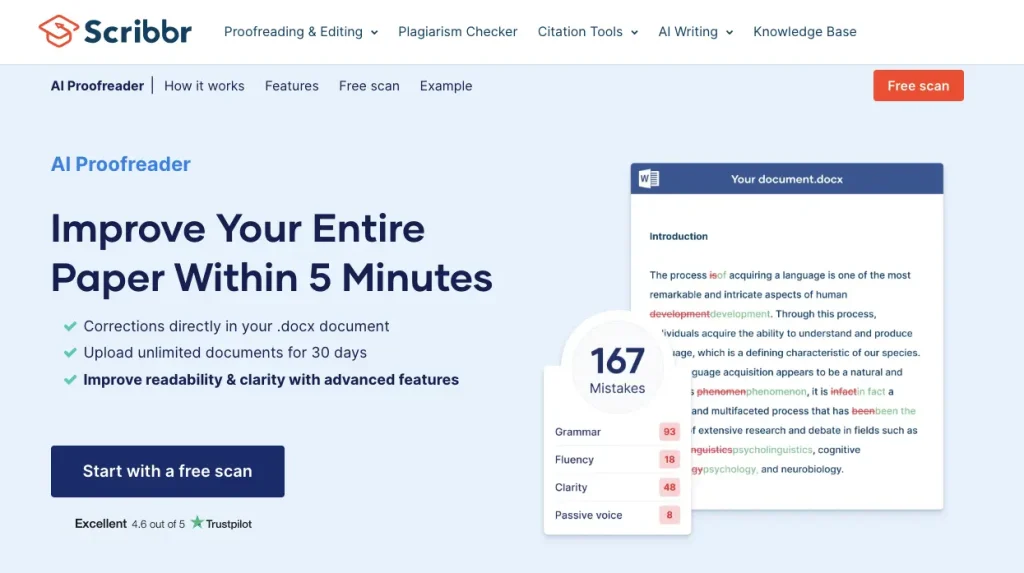
14. Quillbot
For: detecting AI-generated content
Want to make sure your research paper does not include AI-generated content? Quillbot’s AI Detector can identify certain indicators like repetitive words, awkward phrases, and an unnatural flow. It’ll then show a percentage representing the amount of AI-generated content within your text.
Pricing: Free plan available; Premium plan is $19.95/month. See more on pricing.
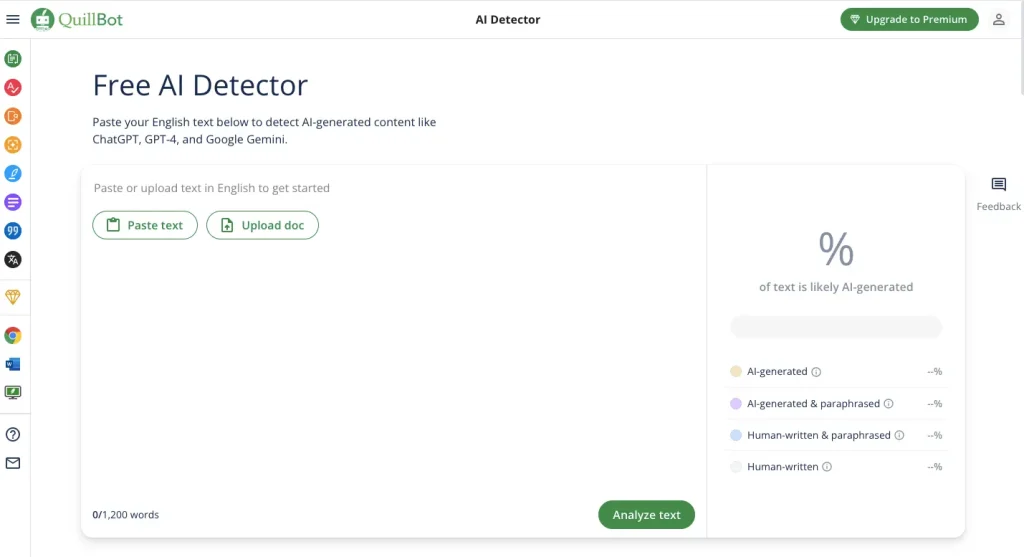
15. Mind the Graph
For: creating research visuals
Mind the Graph uses AI to help researchers transform raw data and concepts into professional-quality figures, infographics, and diagrams. With a library of over 75,000 scientific illustrations, it allows you to create clear visuals for papers, posters, and presentations that meet academic publishing standards. The platform also includes an AI-powered academic writing assistant and a journal finder.
Pricing: Free plan available; Researcher plan is $8/month. See more on pricing.
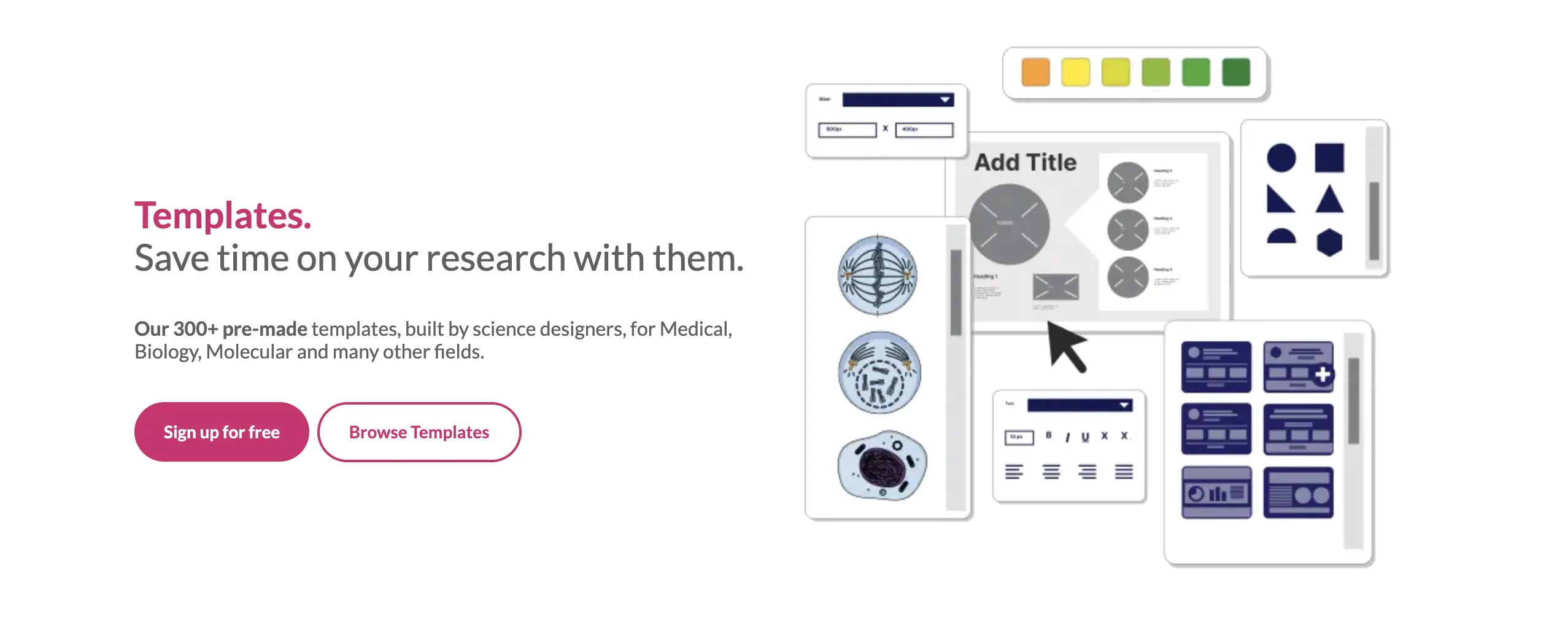
How to Use AI Tools for Academic Research: Best Practices
Before we conclude our blog, we want to list 5 best practices to adopt when using AI tools for academic research. They will ensure you’re getting the most out of AI technology in your academic pursuits while maintaining ethical standards in your work.
- Always remember that AI is an enhancer, not a replacement. Researchers should leverage AI for repetitive tasks, but dedicate their own expertise to interpret results and draw conclusions.
- Don’t take AI for granted. Yes, it can be incredibly efficient, but results still require validation to prevent misleading or inaccurate results.
- Guard yourself against bias. You must critically evaluate the underlying assumptions used by the AI model, and ask if they are valid or relevant to your research question.
- Embrace open science. Sharing your AI workflow and findings can inspire others, leading to innovative applications of AI tools.
- Stay updated. Follow blogs, newsletters (like The Rundown AI), online communities, and training programs to keep pace with rapid developments in AI research tools.

Conclusion
This blog shared 15 powerful AI tools for academic research, and highlighted each tool’s specific function and strengths. It also explained the increasing role of AI in academia, and listed 5 best practices on how to adopt AI research tools ethically.
AI tools hold potential for even greater integration and impact on research. They are likely to become more interconnected, which can lead to groundbreaking discoveries at the intersection of seemingly disparate fields. Yet, as AI becomes more powerful, ethical concerns like bias and fairness will need to be addressed. In short, AI tools for academic research should be utilized carefully, with a keen awareness of their capabilities and limitations.
Frequently Asked Questions
Which AI tool is the most helpful for academic research and writing?
This depends on your specific needs, but many researchers find Paperpal and Scite invaluable for writing and citation accuracy. Paperpal helps with structure, abstracts, and academic phrasing. Meanwhile, Scite verifies the credibility of references.
What are the best generative AI tools for academic research?
Perplexity Academic and Consensus stand out for answering research questions and synthesizing evidence. These tools use advanced natural language processing to go beyond surface-level summaries, generating context-aware outputs tailored to academic work. They are especially useful for brainstorming and quickly mapping out the research landscape.
What are the best large language models for academic research?
Large language models such as GPT-5, Claude Opus 4 and Sonnet 4, Gemini 2.5 Pro, and Llama-based tools power many academic AI platforms. Ultimately, the best option depends on your needs. GPT-5 and Gemini are strong for broad coverage, Claude is excellent for nuanced reasoning, and Llama offers flexibility for open-source customization.
What is the best free AI tool for summarizing research papers?
Semantic Scholar's TL;DR feature provides free, AI-generated summaries specifically designed for academic papers in their extensive research database. Elicit also offers a free tier that can summarize papers and extract key findings, though with some usage limitations. Meanwhile, ChatGPT's free tier works well when you copy-paste paper content, allowing you to work around input limits by processing sections individually.
What are the best AI tools for grad students?
Grad students often benefit from tools like Semantic Scholar for literature review, Maestra for interview transcription, and ATLAS.ti for qualitative analysis. These tools reduce manual workload while offering insights faster. Combined, they support coursework, thesis writing, and long-term research projects.
